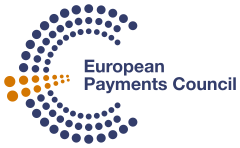European Payments Committee
The European Payments Council (English European Payments Council , abbreviated EPC) is an institution of credit institutions in the European Union . The declared purpose of the committee is the creation of the European Payments Area (SEPA) - which has now largely been implemented. As a decision-making and coordination body, the European Payments Committee is to lead and coordinate the harmonization of the SEPA procedures.
Political background and history
In the Maastricht Treaty of February 7, 1992, the creation of the European Economic and Monetary Union (EMU) was agreed. The core of the contract was the introduction of the euro as legal tender in the participating countries on January 1, 1999 as book and January 1, 2002 as cash . In connection with the preparations for the introduction of the euro, the European Parliament passed a directive on cross-border credit transfers on January 27, 1997. This guideline was aimed at "improving the banking services in the area of cross-border transfers and increasing their efficiency." In a communication from the European Commission to the European Parliament and the Council of the European Union of January 31, 2001 on the improvement of services in cross-border payment transactions it was found that the EU Directive of 1997 had not achieved its objective. This is why the European Commission and the Council issued the EU Price Regulation on December 19, 2001 . Here, by and large, a standardization of prices between domestic payment transactions and payment transactions in euros was stipulated. This regulation was enforced against the opposition of the European banks. The regulatory argument of the banks that this regulation constitutes an interference in free pricing that contradicts market economy principles was not taken into account, mainly because the standardization on a voluntary basis had not made any discernible progress.
In order to prevent further regulations from the legislature in this area, it was necessary to create an institutional framework for the activities of the European banks to standardize and improve retail payment transactions within the European Union. Under the leadership of the European banking associations, a workshop was held in Brussels on March 25 and 26, 2002 , in which 42 major European banks took part in addition to the associations. On the basis of this workshop, the European Payments Committee was set up in summer 2002.
Goal setting
The primary goal is the implementation of the - meanwhile created - European Payments Area (SEPA), which should be implemented within the framework of self-regulation without intervention by the legislature. This objective was summarized in a so-called “white paper”.
organization
The association is a non-profit organization. The seat is in Brussels. Members of the EPC are banks and banking associations from the member countries of the European Union, Switzerland , Iceland , Norway and Liechtenstein . It currently has 74 members from 32 European countries. The number of seats in the individual countries depends on the number of payment transactions in the respective country. A maximum of eight seats are planned per country. Members from Germany are currently BayernLB , the Association of German Banks , the Association of German Volksbanks and Raiffeisenbanks , Deutsche Bank , the Deutsche Sparkassen- und Giroverband , DZ Bank , Commerzbank and LBBW .
The decision-making body is the EPC plenary. There is also the coordination committee, which coordinates the following working groups:
- Legal Support Group
- Electronic Credit Transfer (SEPA transfer)
- Electronic Direct Debit (SEPA direct debit)
- Cash
- Cards
- OITS Standards Support Group ( Operations, Infrastructure and Technology Standards )
Implementation roadmap
In December 2004 the European Payments Committee decided on the “Roadmap 2004-2010”. The primary goal was the development of the three new European payment instruments SEPA transfer, SEPA direct debit and debit card payment. At the same time, a uniform data format and framework for clearing and settlement were developed. The new payment instruments have been offered to end customers since January 28, 2008, initially for cross-border payment transactions. In November 2017, the European Payments Committee approved a payment system based on SEPA and the ISO standard 20022 under the name " real-time transfer " for all EU member states .
Web links
- Official website (English)
- Definition on pay.de
- SEPA and EPC at www.zahlungsverkehrsfragen.de
Individual evidence
- ^ Karl W. Bergemann: The English-German dictionary: 420,000 keywords . Karl W. Bergemann, 2018.
- ↑ Report from the Commission to the European Parliament and the Council of […] on the application of Regulation (EC) No. 2560/2001 on cross-border payments in euros. In: EUR-Lex. February 11, 2008, accessed August 11, 2018 (Section 7.1).
- ↑ PDF ( Memento of the original dated December 22, 2005 in the Internet Archive ) Info: The archive link was inserted automatically and has not yet been checked. Please check the original and archive link according to the instructions and then remove this notice.
